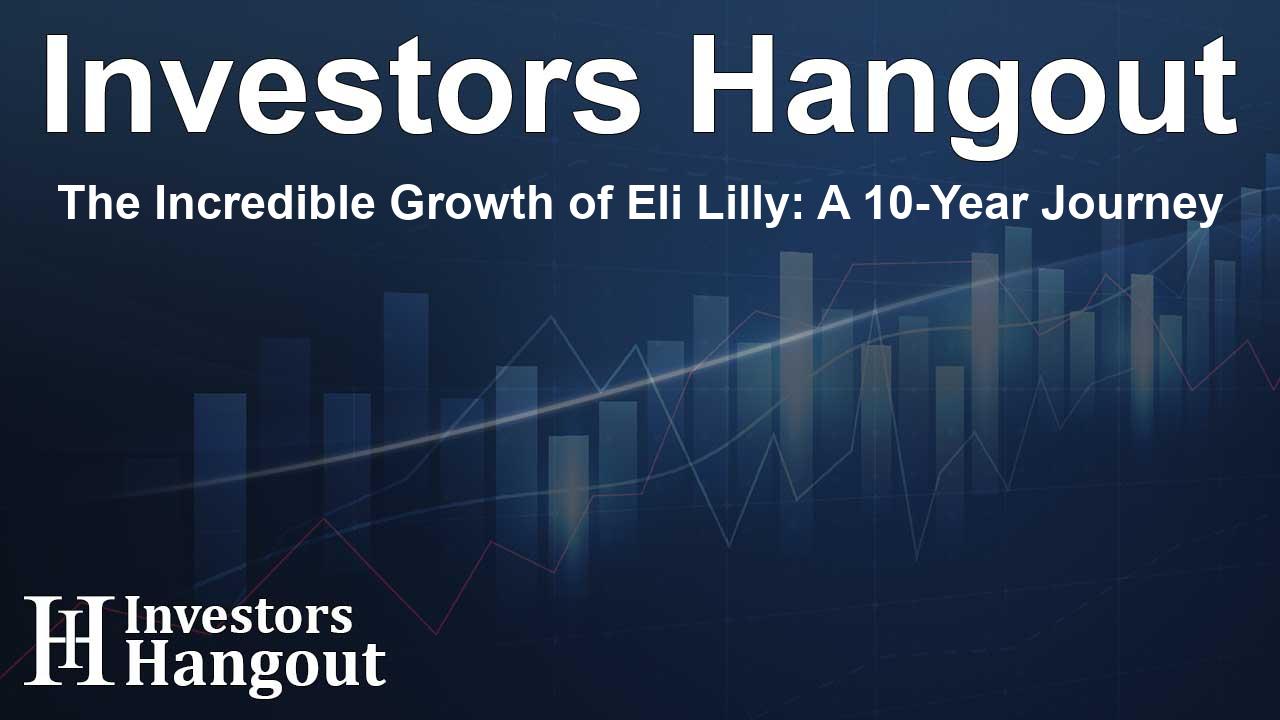The Incredible Growth of Eli Lilly: A 10-Year Journey

Eli Lilly's Remarkable Market Performance
Eli Lilly (NYSE: LLY) has displayed extraordinary growth over the last decade, significantly outpacing the broader market by an annualized return of 13.78%. With an impressive average annual return of 26.64%, Eli Lilly has solidified its standing as a leading player in the pharmaceutical sector. Currently, the company boasts a substantial market capitalization of $757.36 billion, reflecting its influential position within the industry.
An Investment That Paid Off
Imagine investing $1,000 in LLY stock ten years ago; today, that investment would be valued at approximately $10,637.59, based on a current share price of $844.84. This transformation illustrates the impact of longer-term investments in a robust company like Eli Lilly.
Understanding Compounded Returns
The key takeaway from Eli Lilly's journey is the power of compounded returns. As investments grow over time, the returns they generate can create a snowball effect, leading to significant wealth accumulation. Investors who understand and leverage this concept can make informed decisions about their portfolios.
Key Factors Contributing to Growth
Several factors have contributed to Eli Lilly's remarkable growth over the past decade. The company's commitment to research and development has resulted in breakthrough therapies that address critical health needs. Innovations in drug development, alongside a robust pipeline of potential new treatments, have fueled investor confidence and market performance.
Future Outlook for Eli Lilly
Looking forward, Eli Lilly is well-positioned for continued success. The healthcare landscape is constantly evolving, and Eli Lilly is adapting to meet new challenges head-on. By investing in cutting-edge research and maintaining a strong business strategy, the company aims to sustain its growth trajectory.
Engaging with Shareholders
Eli Lilly values its relationship with shareholders and regularly engages with them through updates and educational resources. This transparency helps to foster trust and ensures that investors are informed about the company's strategies and achievements moving forward.
Frequently Asked Questions
How much would a $1,000 investment in Eli Lilly be worth today?
As of now, a $1,000 investment in Eli Lilly would be worth approximately $10,637.59 after ten years.
What is Eli Lilly's ticker symbol?
Eli Lilly's stock is traded under the ticker symbol LLY on the NYSE.
Why has Eli Lilly's stock performed so well?
The company's strong focus on research and development and successful drug innovations have driven its impressive stock performance over the past decade.
What factors are influencing Eli Lilly's future growth?
Eli Lilly's commitment to addressing unmet medical needs through innovative therapies positions it for ongoing growth in the healthcare sector.
How can investors stay updated on Eli Lilly?
Investors can stay informed by following Eli Lilly's press releases, attending shareholder meetings, and monitoring its financial reports.
About The Author
Contact Hannah Lewis privately here. Or send an email with ATTN: Hannah Lewis as the subject to contact@investorshangout.com.
About Investors Hangout
Investors Hangout is a leading online stock forum for financial discussion and learning, offering a wide range of free tools and resources. It draws in traders of all levels, who exchange market knowledge, investigate trading tactics, and keep an eye on industry developments in real time. Featuring financial articles, stock message boards, quotes, charts, company profiles, and live news updates. Through cooperative learning and a wealth of informational resources, it helps users from novices creating their first portfolios to experts honing their techniques. Join Investors Hangout today: https://investorshangout.com/
The content of this article is based on factual, publicly available information and does not represent legal, financial, or investment advice. Investors Hangout does not offer financial advice, and the author is not a licensed financial advisor. Consult a qualified advisor before making any financial or investment decisions based on this article. This article should not be considered advice to purchase, sell, or hold any securities or other investments. If any of the material provided here is inaccurate, please contact us for corrections.
